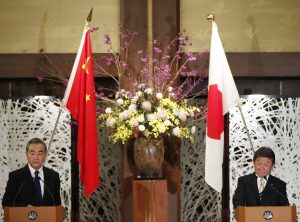Chinese Foreign Minister Wang Yi arrived in Japan on November 24 for a two-day visit, the first by a high-level Chinese official since Japanese Prime Minister Suga Yoshihide assumed office in September. The last Chinese official to arrive in Tokyo was foreign policy chief and Politburo member Yang Jiechi in late February.
Wang met with his Japanese counterpart, Motegi Toshimitsu, on November 24 and is expected to meet with Suga on the 25th.
According to Chinese Foreign Ministry spokesperson Zhao Lijian, Beijing’s goals for the trip were “to implement the important consensus reached by the leaders of the two countries, deepen high-level strategic communication and cooperation in fighting COVID-19 and resuming work and production, strengthen coordination on international and regional affairs and advance the healthy and steady development of China-Japan relations.”
Importantly, one of the “leaders of the two countries” referenced in that statement is no longer in office. The unspoken goal of Wang’s trip was to determine whether Suga would adopt a new approach toward China. His predecessor, longtime Prime Minister Abe Shinzo, was seen as a hawkish figure on security issues, pushing the concepts of both the Quad and the “Free and Open Indo-Pacific.” However, at the same time Abe oversaw a cautious reconciliation with China, the “important consensus” Zhao referenced, which Beijing will be keen to maintain, if not advance.
So far Suga has signaled continuity with Abe’s major foreign policy initiatives across the board. Tokyo continues to walk a fine line between the competing goals of forging alliances to uphold a “rules-based international order” while also trying to bolster relations with China – generally seen as the main threat to that order. For example, Suga’s administration has continued promoting the “Free and Open Indo-Pacific” concept but insists, as Chief Cabinet Secretary Kato Katsunobu did last week, that it is not aimed on containing China. “We plan to achieve it by cooperating with any country that shares the view,” Kato told reporters on November 20.
As a high-profile signal of the health of China-Japan relations, Chinese President Xi Jinping was supposed to undertake a long-awaited state visit to Japan this April. It would have been his first such visit since assuming China’s top leadership role in late 2012 (he has visited Japan since, but only for multilateral talks like last year’s G-20 summit). Xi’s visit was supposed to cement the burgeoning China-Japan thaw, but the visit was cancelled as travel shut down amid the pandemic, and has not been rescheduled since. Japan’s Motegi said before Wang’s arrival that the two would not discuss Xi’s visit, as both sides were focused on COVID-19 management.
Indeed, COVID-19 featured high on the agenda for the Wang-Motegi meeting. In particular, the two foreign ministers agreed to allow business travel between China and Japan without requiring a 14-day quarantine.
They also discussed the ongoing territorial dispute over islands in the East China Sea, with Motegi urging China to adopt a “forward-looking stance” while Wang declared Beijing will “keep protecting our country’s sovereignty.” Japan has reported increased incursions into the waters around the disputed islands by Chinese fishing and coast guard vessels in recent months.
After wrapping up his visit to Tokyo, Wang will head to Seoul. Xi has expressed interest in jumpstarting long-stalled talks on a trilateral free trade agreement between China, Japan, and South Korea. With the Regional Comprehensive Economic Partnership (which includes all three Northeast Asian states) finally sealed earlier this month, that goal may seem closer than ever – but Beijing will have to convince Seoul and Tokyo to look past their ongoing spat over historical and trade issues to make any progress.

































